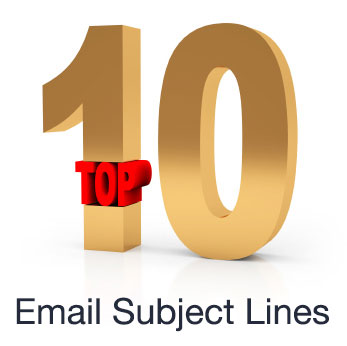WAY back at the start of 2009, I ranked every single headline that I wrote in 2008 for open rate percentage.
I thought you might be interested in the results.
Here are the top 10 Open Rate E-Mail Subject Lines for 2008:
- [firstname], here’s your results
- [firstname], Unbelieveable! Have you ever thought of this one?
- [firstname], do you know of any date conflicts?
- [firstname], finally I have dates for you.
- [firstname], Maybe we should rethink what we are doing together.
- [firstname], have some bad news about Andy
- [firstname], what did you decide?
- [firstname], have to warn you about someone … reluctantly
- [firstname], here’s my response
- [firstname], I heard you were frustrated
To make things even more interesting I sent out the results to a sub-set of my lists in a split test with 3 different subject lines.
- Bad news,[firstname]
- Good news, [firstname]
- Good and bad news, [firstname]
Looks like “good and bad” beats “bad” which beats “good.”
The final rankings are:
- Good and bad news, [firstname]
- Bad news,[firstname]
- Good news, [firstname]
So what does all this mean?
Well NONE of those last three subject lines even came close to beating any of my top-ten despite Frank Kern’s recommendation for a great e-mail subject line.
Beware of reading TOO much into top 10 lists!
Statistics are a way that writers and speakers try to present evidence.
By quoting actual numbers in support of their ideas and conclusions they become more credible.
Many times those statistics are accepted at face value as the final word in what’s actually fact.
Why do they do this — and why should you?
If you throw enough statistics at people, most people won’t refute your ideas.
But …
There are problems with using statistics as evidence.
Whenever your are asked to believe a set of statistics, you need to ask with a critical eye:
- Who generated the statistics?
- What are the statistics measuring?
- Who did they ask?
- When did they do the study?
- What happened before and after the study?
- What are they comparing?
- What are they trying to prove?
You can find numbers in support of just about any idea.
That’s what debates are all about!
It’s your job to examine as many statistics as you can find that support DIFFERENT points of view. INCLUDING mine and Frank Kern’s.
That way you can arrive at your own conclusions based on all of them.
Then why not do your own study and see what works for you.
By the way …
Surveys are AMAZINGLY Inaccurate!
Here’s something you probably won’t dispute.
People are inconsistent.
You may like ice cream today and spinach tomorrow.
Try eating ice cream as your only food for a month. It SOUNDS good for the first few days, it won’t be long until it’s nauseating.
Also remember people MANY times don’t know what they want or even more often can’t tell you why.
In fact, if you are like me even if you know something … you can’t remember!
Then there’s a little thing called “prestige bias.”
That’s when our pride, self-esteem and self-image get involved in our answers.
“Prestige Bias” causes inflated results anytime we think we will look better.
Then there’s looking worse!
Who wants to admit that they watch Jerry Springer?
The truth is people not only stretch the truth. They lie. Especially when they can get away with it and even if they have no real reason to do so.
Finally, lots of surveys try to find out WHY people do what they do.
The problem with that is that most people don’t know why they do things. It’s tough to know why you eat so much and even harder to articulate it.
People who do surveys contribute their own prejudice to the gathering of facts. Most often they are trying to prove something.
So are statistics worth anything?
In 1831, during the cholera plaugue in London William Chadwick and William Farr, collected statistics about who got cholera and where they lived.
Then they looked for the source of the disease.
Statistics identified the Thames River as the source, and eventually they were able to narrow the results to a single pump that supplied water a the main source of the infection. Many lives were saved by those statistics and that’s just a single example.
So back to the top 10 e-mail subject lines …
These are actual results, not a survey, but they STILL have biases.
- I wrote all of the subject lines
- Other people could have written MUCH better subject lines.
- This is my particular audience
- They have very specific interests
- They were used within a specific time-frame (2008)
So are these statistics useless?
Absolutely not!
There are lots of ways to gleen ideas from these results and to test how they work on YOUR audience.
Results will vary.
I’d love to hear about YOUR best e-mail subject lines and YOUR results!
Here’s hoping yours are OUTSTANDING!
All the best,

Ken McArthur
Best-Selling Author and Producer
KenMcArthur.com
The Impact Factor Movie
The Impact Masterminds
The Impact Action Plan Workshops
P.S. Here’s the addresses to find me on Twitter and Facebook …
Twitter:
http://twitter.com/KenMcArthur
Facebook:
http://www.facebook.com/pages/Ken-McArthur/20103565427
P.P.S. Hint, hint …
Want to learn everything I know for less than $15?


